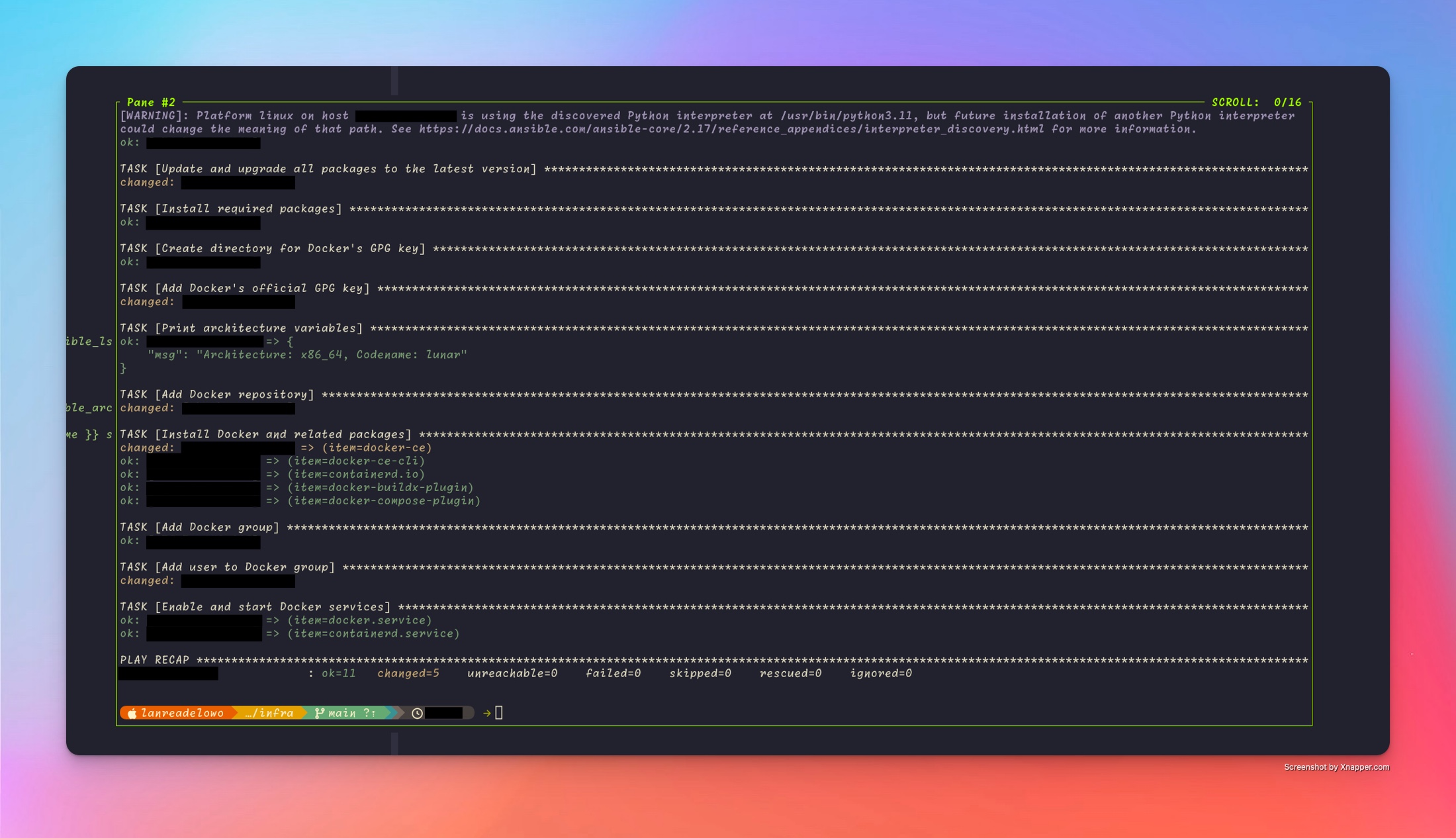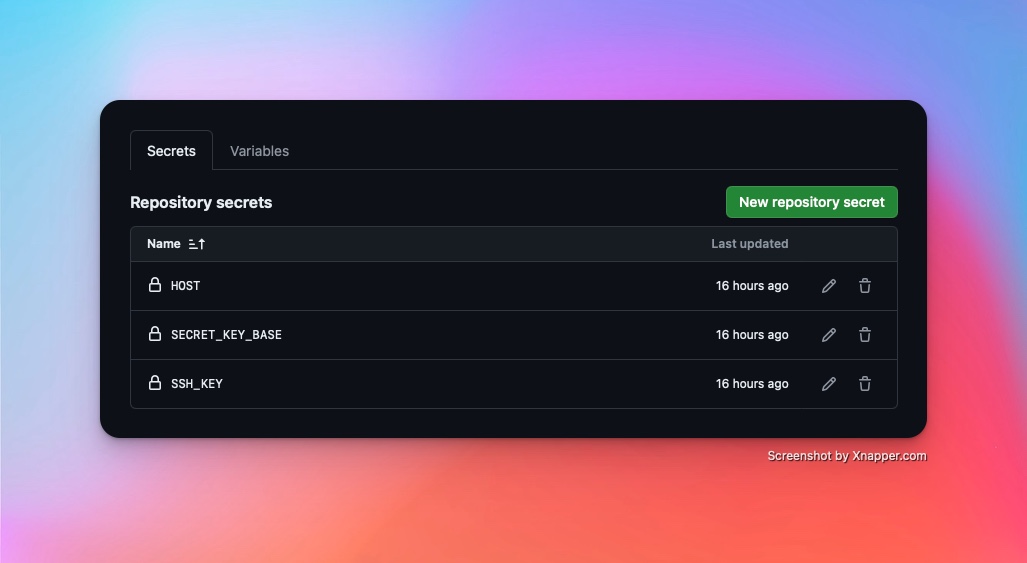Jul 14, 2024
Alternative guide to selfhosting Writebook
7 min read
I wanted to try out Writebook but I ran into 3 major problems:
The authors require you to download an arbitrary script off the internet and run it on your machine. Now, 37Signals is an extremely reputable company but there are really a few people that will randomly execute a script downloaded online.
The script enforces one app per machine. You cannot run any other small apps on the machine alongside Writebook. I already own a small VPS that hosts Fotion and TewoTewo while using Caddy as a proxy in front of them. I want to do the same for Writebook. But even after deciding to run the script, it failed because of this requirement. Now, I am not running a serious Writebook instance, so why would I want yet another 2GB server on my monthly bill?
Calls home. My understanding is every other night, Writebook pings back home to check for updates and replaces them as-is. Personally, I'm not a fan of that.
Luckily, they provide the source code after your download. With that, I was able to build out a simplistic process that runs Writebook alongside other projects on the same VPS and all served by Caddy.
My main tools are:
- Github ( private repository )
- Github actions
- An existing server obviously
- Ansible or a way to ssh into the server manually
Installing Docker
Since I already use Ansible to manage my configuration, here is what my docker creation config looks like:
If you prefer to ssh into the server and do all that manually, install docker and run docker login
---
- name: Install Docker
hosts:
- infra
- main
become: true
vars:
arch_mapping:
x86_64: amd64
aarch64: arm64
tasks:
- name: Update and upgrade all packages to the latest version
ansible.builtin.apt:
update_cache: true
upgrade: dist
cache_valid_time: 3600
- name: Install required packages
ansible.builtin.apt:
pkg:
- apt-transport-https
- ca-certificates
- curl
- gnupg
- software-properties-common
- name: Create directory for Docker's GPG key
ansible.builtin.file:
path: /etc/apt/keyrings
state: directory
mode: "0755"
- name: Add Docker's official GPG key
ansible.builtin.apt_key:
url: https://download.docker.com/linux/ubuntu/gpg
keyring: /etc/apt/keyrings/docker.gpg
state: present
- name: Print architecture variables
ansible.builtin.debug:
msg: "Architecture: {{ ansible_architecture }}, Codename: {{ ansible_lsb.codename }}"
- name: Add Docker repository
ansible.builtin.apt_repository:
repo: >-
deb [arch={{ arch_mapping[ansible_architecture] | default(ansible_architecture) }}
signed-by=/etc/apt/keyrings/docker.gpg]
https://download.docker.com/linux/ubuntu {{ ansible_lsb.codename }} stable
filename: docker
state: present
- name: Install Docker and related packages
ansible.builtin.apt:
name: "{{ item }}"
state: present
update_cache: true
loop:
- docker-ce
- docker-ce-cli
- containerd.io
- docker-buildx-plugin
- docker-compose-plugin
- name: Add Docker group
ansible.builtin.group:
name: docker
state: present
- name: Add user to Docker group
ansible.builtin.user:
name: "{{ ansible_user }}"
groups: docker
append: true
- name: Enable and start Docker services
ansible.builtin.systemd:
name: "{{ item }}"
enabled: true
state: started
loop:
- docker.service
- containerd.service
- name: Log into ghcr.io
docker_login:
registry: ghcr.io
username: github_username
password: "{{ lookup('ansible.builtin.env', 'GH_TOKEN') }}"
reauthorize: yes
handlers:
- name: Docker restart
service: name=docker state=restarted enabled=yesTo run this, you need to retrieve your token from Github. Please make sure the token has the read:packages permission.
This is because we need to configure the installer docker cli on the server to access the github packages repo.
export GH_TOKEN=YOUR_TOKEN
ansible-playbook -i ansible/inventory ansible/docker/install.yml
Building docker image from the source code
Luckily, we have been provided a Dockerfile that does all the hardlifting. We just need to do two things:
- Create a private repo on Github.
- Add, commit, and push the files to Github
- Write the Github actions workflow
In .github/workflows/build-image.yml:
on:
push:
branches:
- main
name: Build Image
jobs:
docker:
runs-on: "ubuntu-latest"
steps:
- name: Get the version
id: get_version
run: echo ::set-output name=tag::$(echo ${GITHUB_SHA:8})
- name: Checkout code
uses: actions/checkout@v4
- name: Login into Docker
uses: actions-hub/docker/login@master
env:
DOCKER_USERNAME: your_github_username
DOCKER_PASSWORD: ${{ secrets.GITHUB_TOKEN }}
DOCKER_REGISTRY_URL: ghcr.io
- name: Build image
run: docker build -t ghcr.io/${GITHUB_REPOSITORY}:${{ steps.get_version.outputs.tag }} .
- name: Push
uses: actions-hub/docker@master
with:
args: push ghcr.io/${GITHUB_REPOSITORY}:${{ steps.get_version.outputs.tag }}
deploy_to_linode:
name: Deploy to Server
needs: [docker]
runs-on: ubuntu-latest
steps:
- name: Get version
id: get_version
run: echo ::set-output name=tag::$(echo ${GITHUB_SHA:8})
- name: Run new image
uses: appleboy/ssh-[email protected]
with:
host: ${{ secrets.HOST }}
username: root
key: ${{ secrets.SSH_KEY }}
script: >
mkdir -p /root/writebook/storage/db &&
mkdir -p /root/writebook/tmp &&
docker stop $(docker ps -a | grep ghcr.io/${{ github.repository }} | awk '{print $1}') || true &&
docker run -d -e SECRET_KEY_BASE=${{ secrets.SECRET_KEY_BASE }} -v /root/writebook/storage:/rails/storage -v /root/writebook/tmp:/rails/tmp -e DISABLE_SSL=true -p 4400:80 --user root ghcr.io/${{ github.repository }}:${{ steps.get_version.outputs.tag }}In the above file, we build the docker image, push it to the Github package repository. Then ssh into the server and run the docker container ( exactly why we had to authorize into the server earlier ).
Notes
You must add a few secrets in the repository settings page as shown in the screenshot below. Use the actual values

You must have noticed I used
--user root. The dockerfile creates arailsuser that owns the process, but the issue now is that when you mount volumes, they will be unwritable because of permissions issues. Using--user rootis acceptable for my usecase. It might not be for yours.If
--user rootis not acceptable for your use case, consider installing Podman on your VPS and use it to run the docker image instead of thedockercommand. The--userns=keep-idfor Podman might resolve this for you. So instead of--user root, something like--userns=keep-id --user $(id -u):$(id -g)might work for you.
Updating Caddy
As mentioned earlier, Caddy is really the heart of my setup. I have configured Caddy as below.
I have two files majorly, the main.yml and the templates/caddyfile-main.j2
The main.yml file looks like this:
---
- hosts: main
become: yes
name: Install and Set up Caddy
roles:
- role: maxhoesel.caddy.caddy_server
caddy_config_mode: "json"
caddy_json_config: "{{ lookup('template', 'templates/caddyfile-main.j2') }}"While the templates/caddyfile-main.j2 file looks like this:
{
"logging": {
"logs": {
"": {
"level": "error"
}
}
},
"apps": {
"http": {
"servers": {
"api": {
"listen": [":443"],
"routes": [
{
"match": [
{
"host": ["api.usefotion.app"]
}
],
"handle": [
{
"handler": "reverse_proxy",
"upstreams": [
{
"dial": "localhost:4200"
}
]
}
]
},
{
"match": [
{
"host": ["api.tewotewo.com"]
}
],
"handle": [
{
"handler": "reverse_proxy",
"upstreams": [
{
"dial": "localhost:4300"
}
]
}
]
},
{
"match": [
{
"host": ["notes.ayinke.ventures"]
}
],
"handle": [
{
"handler": "reverse_proxy",
"upstreams": [
{
"dial": "localhost:4400"
}
]
}
]
}
]
}
}
}
}
}Extras
Two extra Github actions workflow that might make sense for you to implement are:
Weekly download of the source code, diff the content of the
app/andvendor/directory, if files have changed, commit and push the changes so the build and deploy process can kick offDaily backup of the sqlite3 file and upload to S3 or some other storage in case your VPS dies or something bad happens :).
Github actions support scheduling and cronjobs so this can be easily achieved. An untested example of the first one can look like this:
on:
schedule:
## run at 12 pm every day
- cron: "0 12 * * *"
push:
branches:
- main
name: Download newer releases
jobs:
docker:
runs-on: "ubuntu-latest"
steps:
- name: Checkout code
uses: actions/checkout@v4
- name: Install unzip
run: sudo apt-get install unzip
- name: Download and unzip file
run: >
wget -O downloaded https://auth.once.com/download/YOUR_TOKEN_FROM_EMAIL &&
unzip downloaded &&
mv downloaded/{app,bin,config,db,lib,script,vendor} ./
- name: Commit and push changes
uses: devops-infra/action-commit-push@master
with:
github_token: ${{ secrets.GITHUB_TOKEN }}
commit_message: Update files